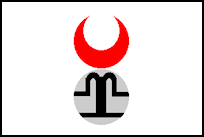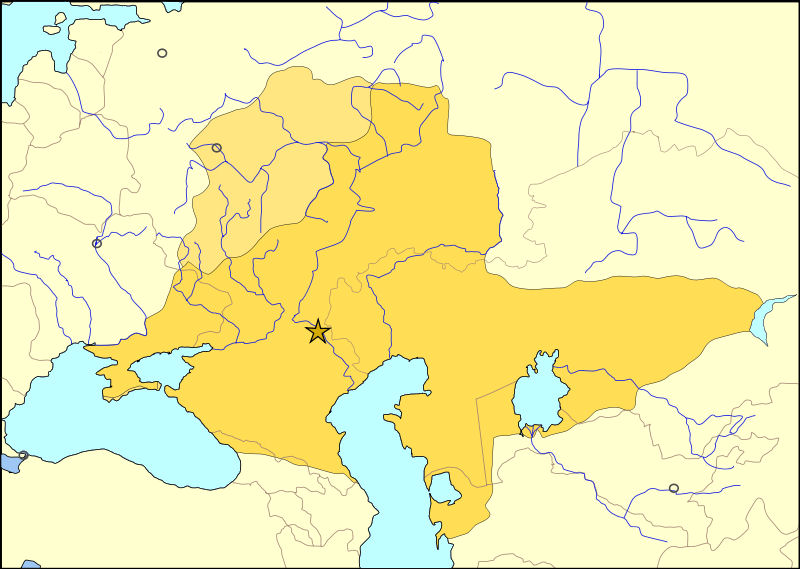The Golden Horde / Kiptchak Mongols - 1236-1502 AD
 To Juji, the eldest son of Chingiz, were assigned the tribes of the old empire of Kara-Khitay, north of the Sihiin or Jaxartes, and here he, dying before his father, was succeeded by his eldest son Orda. A younger son of Juji, Batii, by his famous invasion of Europe, extended the appanage of his family much further to the west, and secured for himself the sovereignty of the Turkish Khanate of Kipchak. North of Batu's territory, another brother, Tuka-TimOr, appears to have been allotted the district of Great Bulgaria, on the Upper Volga; a fourth son of Juji, Shayban, ruled the steppes now known as those of the Kirghiz Kazaks, north of Orda's appanage, and a fifth, Teval, led the Pechenegs, afterwards known as Nogays, between the Ural and Yemba. All these tribes and their chiefs were more or less subject to the family of Batii, which, although a younger branch, had acquired the greatest power and had made their capital Saray on the Volga the metropolis of the Jiijid empire; and all these tribes are included in the general name Golden Horde, socalled from the Khan's royal camp, Sir Orda or Golden Camp. It must be added that only the ruling family and the cream of the army were of Mongol race: the vast majority of the tribes allotted to the sons of Juji -were conquered Turks or Turkomans.
To Juji, the eldest son of Chingiz, were assigned the tribes of the old empire of Kara-Khitay, north of the Sihiin or Jaxartes, and here he, dying before his father, was succeeded by his eldest son Orda. A younger son of Juji, Batii, by his famous invasion of Europe, extended the appanage of his family much further to the west, and secured for himself the sovereignty of the Turkish Khanate of Kipchak. North of Batu's territory, another brother, Tuka-TimOr, appears to have been allotted the district of Great Bulgaria, on the Upper Volga; a fourth son of Juji, Shayban, ruled the steppes now known as those of the Kirghiz Kazaks, north of Orda's appanage, and a fifth, Teval, led the Pechenegs, afterwards known as Nogays, between the Ural and Yemba. All these tribes and their chiefs were more or less subject to the family of Batii, which, although a younger branch, had acquired the greatest power and had made their capital Saray on the Volga the metropolis of the Jiijid empire; and all these tribes are included in the general name Golden Horde, socalled from the Khan's royal camp, Sir Orda or Golden Camp. It must be added that only the ruling family and the cream of the army were of Mongol race: the vast majority of the tribes allotted to the sons of Juji -were conquered Turks or Turkomans.
The family of Juji has to be considered in the following distinct lines:
|
| Cuci - Han | 1223 | 1227 |
| Batu [Batur] | 1227 | 1256 |
| Sartak Han | 1256 | 1257 |
| Olakci Han | 1257 | |
| Berke Han | 1257 | 1266 |
| Mengu - Timur Han | 1266 | 1280 |
| Tuda - Mengu Han | 1280 | 1287 |
| Tula - Buga Han | 1287 | 1290 |
| Tokta Han | 1290 | 1312 |
| Ozbek Han | 1312 | 1341 |
| Tini Bek Han | 1341 | |
| Cani-Bek Han I | 1341 | 1357 |
| Berdi-Bek Han | 1357 | 1360 |
| Kulpa Han | 1360 | |
| Nevruz-Bek Han | 1360 | 1361 |
| Hizir Han | 1361 | |
| Timur Hoca Han | 1361 | |
| Avdul Han | 1361 | 1362 |
| Kildi Bek Han | 1362 | |
| Murut Han | 1362 | 1363 |
| Aziz Han | 1363 | 1367 |
| Cani Bek Han II | 1367 | |
| Pulad-Demir Han | 1367 | |
| Bulak Han | 1367 | 1370 |
| Tulun - Bek Hanim | 1370 | 1372 |
| Ilban Han | 1372 | 1374 |
| Ala Hoca Han | 1374 | |
| Urus Han | 1374 | 1376 |
| Timur - Melik Han | 1376 | 1377 |
| Toktamish Han | 1377 | 1395 |
| Timur - Kutlug Han | 1395 | 1400 |
| Sadi - Bek Han | 1400 | 1408 |
| Pulad Han | 1408 | 1410 |
| Timur Han | 1410 | 1411 |
| Celaleddin Han | 1411 | 1412 |
| Kerim-Berdi Han | 1412 | 1417 |
| Kepek Han | 1414 | 1415 |
| Kaadir-Berdi Han | 1415 | 1416 |
| Cebbar-Berdi Han | 1416 | 1419 |
| Ulug-Muhammed Han | 1419 | 1435 |
| Seyid-Ahmed Han I | 1435 | 1465 |
| Seyyid-Ahmed Han II | 1465 | 1481 |
| Seyyid-Ahmed Han III | 1481 | |
| Mutuza Han | 1481 | 1499 |
| Seyh - Ahmed Han | 1499 | 1502 |
There were five branches of Juji's house from which claimants for the Golden Khanate might spring, on the extinction of Batu's line. North and south, in Great Bulgaria and the Krim, ruled the numerous progeny of Tuka-Timur. South also, by the Caucasus, camping along the Terek and Kuma, were the descendants of Baraka, the younger brother and second successor to Batu, to whom the Golden Horde owed much of its terrible prestige. East of the Great Khanate was the White Horde with its chiefs of the family of Orda; and also east, but further north, were the Uzbeg tribes of Shayban's leading; whilst along the northern shore of the Caspian the clans of Nogay pastured their herds. The attribution of the fifteen khans of this period of rival families to their several ancestors in the table on page 230 is partly conjectural, but their dates are established by coins. In 1378, the sovereignty of the Golden Horde passed into the family of Orda in the person of Toktamish.
The line of Orda: -Appanage, the White Horde in Eastern Kipchak, 1226-1428 [The country of the Lower Jaxartes and the Ulugh and Kuchuk Tag Mountains : bounded on the west by Batu's Blue Horde, on the north by Shayban's Uzbegs, on the east by Chagatay's Khanate, on the south by the desert of Kizil Kumm and the Alexandrovski range]; Khans of the Golden Horde in Western Kipchak, 1378-1502 ; Khans of Astrakhan, 1466-1554. Although Batii was the most powerful of the sons of Juji, Orda the eldest inherited his father's appanage by the Jaxartes, and received a special homage as hereditary head of the family. He ruled the left division of the Golden Horde, known as the White Horde (Ak Orda), (a colour which ranked higher than the Blue), in distinction from the right wing, or Batu's tribes, which were designated the Blue Horde (Kok Orda) in token of imaginary dependence. Living in the far-away steppes beyond the Caspian, the White Horde soon yielded the palm to its Blue brethren on the Don and Volga; but in its rough wintry life it retained a vigour and hardihood which eventually placed its rulers on the throne of the more civilized and decayed descendants of Batu.
known; the Khanate passed regularly from father to son; and the only noticeable fact is the possession by Kiichl of a territory at Ghazna and Bamiyan under the suzerainty of either the Chagatay Khans or the Il-khans of Persia. Uriis Khan is the first chief of Orda's line who possesses any individuality in the history of the White Horde. He had the distinction of defeating the troops of Tlmur more than once. Tlmur in his overbearing fashion had appointed to the sovereignty of the tribes of Juji's appanage a member of Orda's family, Toktamish, whose father had been killed and he himself exiled by Urus Khan. Assisted by the troops supplied by Tlmur to carry his nomination into effect, Toktamish sustained several repulses at the hands of Urus, and it was not till after the death of this Khan and the short reign of Toktakya his son that Toktamish was able to wrest the command of the White Horde from another son of tJriis, Timur Malik.
Toktamish is 'the last really great figure in the history of the Golden Horde.' After seizing the throne of the White Horde he marched upon Western Kipchak, defeated Mamay, the king-maker of Saray, and by this victory in 1378 (780) put an end to the division between the White and the Blue Hordes, and united Eastern and Western Kipchak under his sole rule. Henceforward Orda's family ruled the Blue Horde, bringing no doubt the cream of the White Horde with them; and their original camping-grounds gradually passed into the hands of the descendants of Shayban. Under Toktamish the Golden Horde recovered much of its prestige. A great campaign was carried into Russia, Moscow was sacked and burnt (1382), and the Grand Principality was ravaged with the ancient fury of the Mongols. This revival of the glory of Kipchak, however, was only the flicker of a dying torch. Toktamish had the misfortune or the ingratitude to quarrel with the prince who had helped him to his success; and no one offended Tlmur with impunity. The great conqueror in two campaigns, one marked by the battle of Urtupa on the 18th June, 1391, and the second by a crushing defeat near the Terek in 1395, when Toktamish had returned from exile, destroyed for ever the power of the Khans of Kipchak. Toktamish indeed re-entered Saray in 1398, after Tlmiir's departure, but he was speedily driven out again by Tlmur Kutlugh, son of his old enemy, TJrus, and forced to take refuge with the Lithuanian prince Vitut, whom he involved in war with the Tatars; he died in 1406.
The period succeeding the overthrow of Toktamish is one of the most obscure in the labyrinth of dark passages which the history of the Golden Horde affords. It is filled with the incessant struggles of Rival Families for the throne. There were at least three distinct sets of candidates for the decayed Khanship: the family of Urus Khan, supported by the Nogay chief Idiku, the second king-maker of Kipchak; the sons of Toktamish ; and some younger members of the family of Shayban. The table on page 232 will give an idea of this confused period. The rival Khans not only ruled simultaneously in Kipchak, but held the same cities in the same -years; and the history of Saray and other large towns must have been the record of continual sieges and recaptures.
This is the end of the Golden Horde. It was absorbed by Russia in 1502 (907), and its history degenerates into the petty annals of its scattered fragments. Of these one alone belonged to the family of Orda-the insignificant Khanate of Astrakhan,* founded by Kasim, a grandson of Kuchuk Mohammad, about 1466, and held by his descendants until its abolition in 1554 by the Grand Prince of Moscow.


|
NEWSLETTER
|
| Join the GlobalSecurity.org mailing list |
|
|
|

